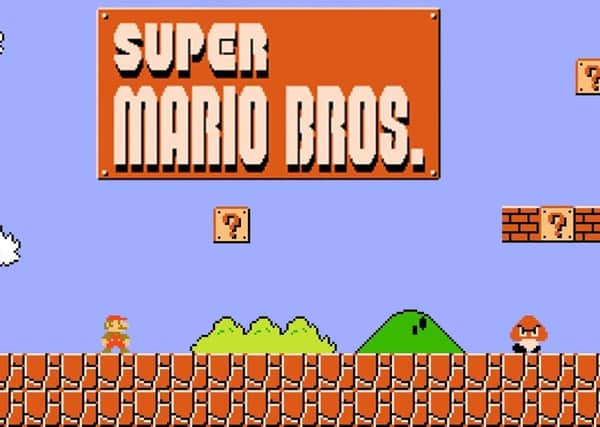OPINION: Remember old school video games that now seem so basic?


Anyone remember those bygone days of yore (no, not 1690) but the embryonic years of video game development, the era of Space Invaders, Pac-man, Mario Brothers, Tetris and Sonic the Hedgehog?
I still recall sitting with my brother circa the early 1990s when we got a Nintendo, plugged into a delapidated black and white TV (we lived in relative penury) when we excitedly switched onto Mario Bros World One, Level One, and a fat little mushroom came rolling across the screen towards a tiny figure, a mustachioed cap-and-dungaree wearing Italian plumber, who grew magically in stature at the moment of consumption, but sadly did not manifest any of the traits of psychedlic magic mushrooms, which would have made for a far more trippy and surrealist experience altogether.
Advertisement
Hide AdAdvertisement
Hide AdMario, or his brother Luigi, had to save Princess Peach from various far-off castles, going in and out of pipes and through mazes to enter into mortal combat with an evil turtle-like dragony thingy named Bowser that breathed fire, destroyed bridges and engaged in other malevolent activities designed to keep the entrapped royal in world after world of ever increasing difficulty.
I was crap at it, to be honest, but my brother and his mates would play this for hours until their eyes dilated like saucers and they almost incurred carpel tunnel syndrome from hyper-active use of the remedial consoles.
Space Invaders was earlier still, and involved an array of various bug-like creatures moving in waves gradually towards the bottom of the screen as you skitted about from left to right, firing one shot at a time with four bullet-shield bunkers you could hide behind if you were wily, with the overall goal being, naturally, to kill all the dastardly aliens. Each time you dispatched with one, another pernicious blighter would move faster so that the last little beggar was damn near impossible to annihilate. And once you defeated the last alien, you started all over again, trying to beat your previous score.
Pac-man was arguably the first game to have a character you could control in a computer generated world, originating in 1980, obviously way, way before I arrived on earth, and the objective was to clear the maze of pills by swallowing them and simultaneously avoiding four persistent ghosts (you could disable all of them if you ate a power pill that increased their vulnerability to attack).
Advertisement
Hide AdAdvertisement
Hide AdI also remember Game Boys, and the weirdly addictive tedium that was Tetris, where you had to fit all kinds of configurations of four squares to make up a vertical or horizontal line in order to gain points (I can still hear the terrible background tune, an electronic loop of growing irritation that became wired into your skull about four or five hours in, so that you could hear it for nights afterwards).
My mate was ace on Sega’s Sonic the Hedgehog, running as quickly as you could from left to right collecting rings, jumping on platforms and scooting down multicoloured tubes with mad rollercoaster intermissions over which you had minimal control.
Then, everyone but everyone was playing Street Fighter and Street Fighter II back in the late 80s and early 90s (although not me, as I was too busy doing quadratic equations and reading Nietzsche).
That game was pretty much as the title suggests, with musucular or weedy figures throwing punches at each other until you had battered your nemesis to death, his energy bar zappd to zero. Am told my those in the know that Street Fighter II changed everything, the graphics were amazing, the sound was fantastic (like bone-crunching, pows and zaps and punches landing like the sound of crisp packets violently scrunching) with ferocity and to become good at it was actually the equivalent of mastering a martial art; there was even a female character - Chun-Li - just for the sake of gender equality - with incredibly impressive muscular thighs. The ability to do dragon punches and throw fireballs was a vicarious outlet for testosterone and teenage angst in an era when physical violence was sadly all too predominant on the actual streets of Northern Ireland.
Advertisement
Hide AdAdvertisement
Hide AdI also distinctly remember being an astonishing loser at Super Mario Kart circa 1996, when you had to speed round ever more complex chicanes or rainbow circuits with missing platforms, or through beachy expanses, or past ghosts in a haunted house, and weirdly abstract donut plains, or even through the fearsome confines of Bowser’s Castle.
For years, I didn’t win a single round.
These days when gamers take high quality graphics and complex consoles for granted, or even decide to play their games using virtual reality headsets that allow you to at once sit on your sofa and wander through a fantasty land with jumping dolphins and palm trees, clouds with faces and Japanese music, or through snow-saturated kingdoms where you must battle warriors and wield swords, the primitive days of Pac-man and Mario seem utterly out-moded.
But there was a time when that tiny Mario figure eating his first magic mushroom on a black and white TV with the most rudimentary console was the height of technological gaming excitement.
We’ve come a long way, and poor Mario and Luigi have largely become retro fixations, (although aficionados are still going strong and new tech allows you to make your own Mario games, though don’t ask me how), along with Pac-man and Sonic and Donkey Kong Country, featuring the gorilla who had to reclaim all the bananas stolen by King K.Rool as he swung from vines and took the occasional mine cart ride or swam through worlds of tropical fish.
Comment Guidelines
National World encourages reader discussion on our stories. User feedback, insights and back-and-forth exchanges add a rich layer of context to reporting. Please review our Community Guidelines before commenting.